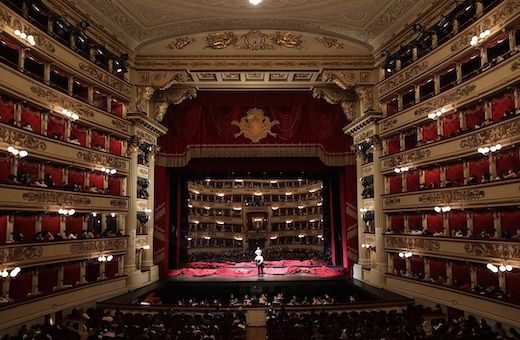Robert Carsen’s 2011 production of Don Giovanni is a celebration of the Teatro alla Scala, and a total, complete surrender to the Don’s seduction. Michael Levine's sets show different parts of the very theatre we are sitting in: different panels of various sizes, representing the curtain, slide on stage; the proscenium is multiplied in a perspective creating an infinite tunnel; the costumes for the Don's party are of the same velvet of the curtain and the chairs. On many occasions the theatre itself becomes a stage, often with the typical Carsen trait of a giant mirror reflecting the theatre's interior back to us. The masqueraders enter the theatre through the orchestra stalls (“Bisogna aver coraggio”), as do Don Giovanni and Leporello at the beginning of Act 2, when they are fighting (“Eh via buffone”), walking back and forth in the aisle before going on stage. And the Commendatore’s statue, in the Graveyard Scene, is in the Royal Box, reflected to us in a distorting mirror. The visuals are stunning, the acting engaging, involving the audience in the performance, with the protagonist at times becoming the spectator, watching us.

Carsen clearly fell in love with Don Giovanni. He depicts him as a freethinker, an individualist unrestrained by any fears, a good-natured bon vivant who fascinates everybody and is hated because he refuses to be restrained and tamed. He emerges as a timeless persona, almost the incarnation of the platonic idea of human freedom from God and from death. There is no criminal intent, no true evil in him. In the first scene we see Donna Anna more than willingly engaged in making love to him, her “Gente, servi!” and the whole confrontation played as in jest. This makes her confession to Don Ottavio, a bit later, dangerously close to a false rape accusation motivated by jealousy, which is not a great look.
But the worst feature of this production is, in my opinion, the devastating effect which at times (only at times) it has on the musical experience. The backstage is often opened completely, no backdrops anywhere to help the singers’ projection, and the sound just gets lost. La Scala’s stage and backstage are famously enormous. The very first trio was completely drowned by the orchestra. During Elvira’s aria “Ah chi mi dice mai” several panels were progressively slid behind her, the sound improving at each one. When Zerlina screams for help from the backstage during the party, her voice was amplified and painfully distorted. It would not have been hard, or detrimental to the production visuals and concept, to have at least a black panel as a “ceiling” to improve the projection.
This aspect was not helped by conductor Pablo Heras-Casado, who did not seem to do much to try to adjust the volume of the orchestra to improve the balance, drowning the singers every time the backstage opened up as a parade ground. The overture, as well as many other numbers, was taken at considerable speed, giving a rushed feeling. The excellent La Scala orchestra managed to keep the tempo with no problems, but some of the sublimity of Mozart’s music was lost at times, although many details were successfully highlighted.
The singing cast was uniformly excellent. Christopher Maltman’s noble baritone gave Don Giovanni an aristocratic countenance, his phrasing always elegant. He managed with ease all the little ornamentations of “Fin ch’han dal vino”, and his serenade “Deh, vieni alla finestra” was sweet and tender. Alex Esposito, a veteran of the role, was the perfect Leporello. He lives and breathes this character, rather than just singing it; his interpretation, describable as a balanced mixture of Arlecchino and Figaro, was spot on: he truly came through as the motor moving the action. His Catalogue Aria was beautifully rendered, his technically flawless bass-baritone enticing and elegant.
Hanna-Elisabeth Müller’s soprano, with luminous high notes, gave Donna Anna a sweet, tender temperament. Her “Non mi dir” showed great legato and phrasing, the coloratura perfectly executed. Donna Elvira was Emily D’Angelo, who sailed through this challenging role with seemingly no effort. Her mezzo is brilliant and exciting, very confident in the high register, supported by a remarkable breath control, which made her legato all the better.
Bernard Richter’s Don Ottavio was more confident and stronger than most, a virile presence. His high, bright tenor was very well suited to the part, and his Mozartian style perfect. He came through in both arias, with a particularly successful “Il mio tesoro”. Günther Groissböck was a commanding Commendatore, with a deep well-set bass. Andrea Carroll convinced as Zerlina, her high soprano delicate and coquettish. Her husband, Masetto, was Fabio Capitanucci, who showed some roughness around the edges, but gave nevertheless a convincing performance.


